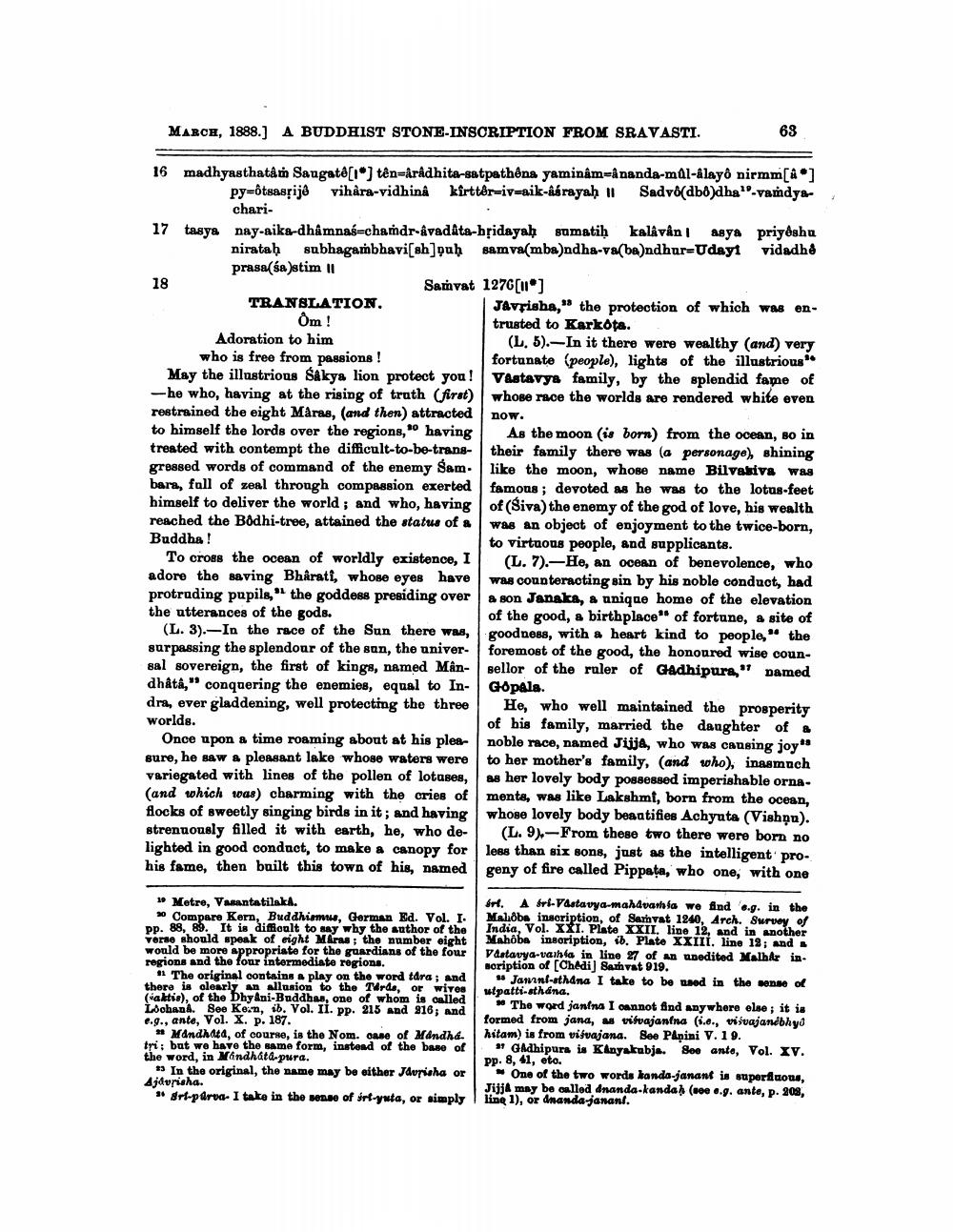________________
MARCH, 1888.) A BUDDHIST STONE-INSCRIPTION FROM SRAVASTI.
63
16 madhyasthatâm Sangatói tên-ArAdhita-satpathôns yaminam-Ananda-mål-alayo nirmm[AO]
py=ôtsassij& vihara-vidhin karttêr-iv-aik-israyah | Sadvo(db)dha"-vandya
chari17 tasya nay-aika-dhämnas-chamdr-avadta-hridayah sumatiḥ kalâvân! aya priydshu
niratah subhagambhavi[sh]puh samva(mba)ndha-va(bandhur-Udaytvidadhe prasa(sa)stim 11
Samvat 1276[11] TRANSLATION.
Javrisha," the protection of which was enOm !
trusted to Karkota. Adoration to him
(L. 5).-In it there were wealthy (and) very who is free from passions !
fortunate (people), lights of the illustrious" May the illustrions Sakya lion protect you ! Vastavys family, by the splendid fame of - he who, having at the rising of trath (first) whose race the worlds are rendered white even restrained the eight Maras, (and then) attracted now. to himself the lords over the regions," having As the moon (is born) from the ocean, so in treated with contempt the difficult-to-be-trang- their family there was a personage), shining greased words of command of the enemy Sam. like the moon, whose name Bilvasivs was bara, fall of zeal through compassion exerted famons; devoted as he was to the lotus-feet himself to deliver the world; and who, having of (Siva) the enemy of the god of love, his wealth reached the Bodhi-tree, attained the status of a was an object of enjoyment to the twice-born, Buddha !
to virtuous people, and supplicants. To cross the ocean of worldly existence, I (L. 7).-He, an ocean of benevolence, who adore the saving Bharati, whose eyes have was counteracting sin by his noble conduct, had protruding pupils," the goddess presiding over a son Janaka, a unique home of the elevation the utterances of the gods.
of the good, a birthplace of fortune, a site of (L. 3).-In the race of the Sun there was, goodness, with a heart kind to people," the surpassing the splendour of the sun, the univer- foremost of the good, the honoured wise counsal sovereign, the first of kings, named Mån- sellor of the ruler of Gadhipura," named dhâta," conquering the enemies, equal to In- Gopala. dra, ever gladdening, well protecting the three He, who well maintained the prosperity
of his family, married the daughter of a Once upon a time roaming about at his plea noble race, named Jijja, who was canging joy" sure, he saw a pleasant lake whose waters were to her mother's family, and who), inasmuch variegated with lines of the pollen of lotases, as her lovely body possessed imperishable orna(and which was) charming with the cries of mente, was like Lakshmi, born from the ocean, flocks of sweetly singing birds in it; and having whose lovely body beautifies Achyuta (Vishņu). strenuously filled it with earth, he, who de- (L. 9).-From these two there were born no lighted in good conduct, to make a canopy for less than six sons, just as the intelligent prohis fame, then built this town of his, named geny of fire called Pippata, who one, with one
worldg.
1 Metre, VasantatilakA. 0 Compare Kern, Buddhisme, German Ed. Vol. I.
88. 8. It is difficult to say why the author of the vorne should speak of eight Maras; the number eight would be more appropriate for the guardians of the four regions and the four intermediate regions.
* The original contains a play on the word tdra; and there is clearly an allusion to the Turda, or wives (aktis), of the Dhyani-Buddhaa, one of whom is onlled Loohan. See Kern, ib. Vol. II. pp. 215 and 916; and e.g., ante, Vol. X. p. 187.
* Mandhata, of course, is the Nom. one of Mandha. the word, in Mindháta-pura.
In the original, the name may be either Jaupisha or Ajdvrisha.
** Srt-parva. I take in the sense of srt-yuta, or simply
Srl. A trl-Vastavya-mahdvania we find .g. in the Malioba inscription, of Sarvat 1240, Arch. Surusy of India, Vol. XXI. Plate XXII. line 12. and in another Mahoba inaoription, ib. Plate XXIII. line 12; and Vaatavya-vaihia in line 27 of an unedited Malha in. scription of Chedi) Samvat 919.
Jamni-athana I take to be wed in the sense of utpatti-sthana.
The word jantna I cannot find anywhere else; it ia formed from jana, a vitvajantna (1.., vifuajandbhyo hitam) is from vifvajana. Bee Papini V.19.
91 GAdhipura is Kanyakubje. Soe anto, Vol. xv. Pp. 8, 41, eto.
One of the two words kanda-janant is superfluous, JijjA may be called Ananda-kanda) (100 ..g. ante, p. 208, line 1), or Ananda-jananl.




